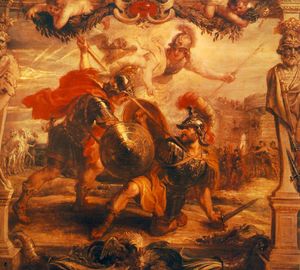Iliad: Difference between revisions
Appearance
No edit summary |
No edit summary |
||
| (One intermediate revision by the same user not shown) | |||
| Line 1: | Line 1: | ||
[[Image:Rubens.jpg|thumb|Achilles and Hector]] [[Epic Poetry| | [[Image:Rubens.jpg|thumb|Achilles and Hector]] The <i>[[Iliad]]</i> (a song about Ilium, or Troy) along with its companion [[Epic Poetry|epic]] the <i>[[Odyssey]]</i> form the foundation of ancient Greek culture and address the extremes of human experience through war and peace. Both epics are primary, or oral, epics that draw on an enormous wealth of cultural stories in unified structures that we attribute to the poet [[Homer]], in eighth century B.C.E. The epics are written in an unsentimental style: the <i>[[Iliad]]</i> depicts the ambivalence of war in meticulously accurate details. Both the nightmare of war and its excitement find expression in the <i>[[Iliad]]</i>, just as the <i>[[Odyssey]]</i>’s pages quest for a home, or a peace that seems hard-won after the devastation of war. | ||
* [http://litmuse.maconstate.edu/~glucas/archives/000312.shtml The <i>Iliad</i>: Rage and War] | * [http://litmuse.maconstate.edu/~glucas/archives/000312.shtml The <i>Iliad</i>: Rage and War] | ||
[[Category:world Literature|Iliad]] | |||
Latest revision as of 16:43, 9 November 2004

The Iliad (a song about Ilium, or Troy) along with its companion epic the Odyssey form the foundation of ancient Greek culture and address the extremes of human experience through war and peace. Both epics are primary, or oral, epics that draw on an enormous wealth of cultural stories in unified structures that we attribute to the poet Homer, in eighth century B.C.E. The epics are written in an unsentimental style: the Iliad depicts the ambivalence of war in meticulously accurate details. Both the nightmare of war and its excitement find expression in the Iliad, just as the Odyssey’s pages quest for a home, or a peace that seems hard-won after the devastation of war.
